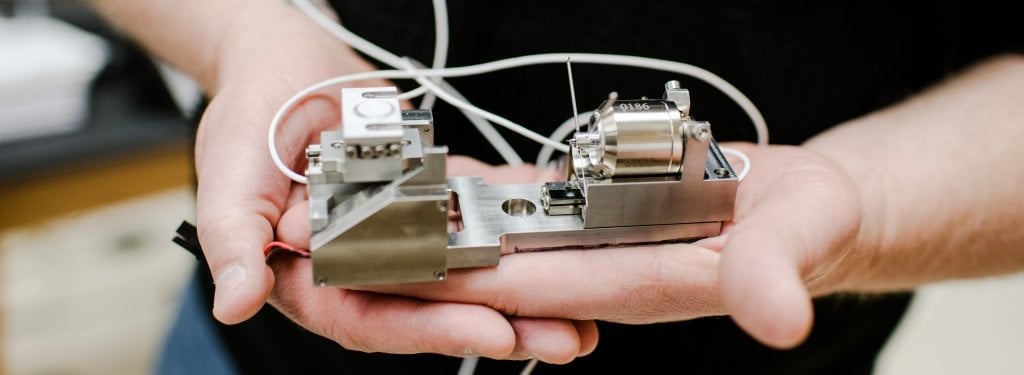Does fatness affect health if you are fit? Is it more important for an obese person to gain aerobic fitness or to reduce body fat?
To help answer this question of national and local interest, John Durocher, assistant professor of biological sciences, is studying how obesity and fitness affect the sympathetic nervous system and arterial blood pressure responses to stress.
The Centers for Disease Control and Prevention estimates that 78.6 million Americans are obese, with an annual medical cost of $147 billion. And, Michigan is one of 19 states where the population has a prevalence of obesity between 30 and 35 percent. Sobering statistics like these help drive Durocher's research.

"We want to know if aerobic exercise alone, combined aerobic and resistance exercise, or a low-calorie diet, is most effective at reducing visceral fat and cardiovascular reactivity to acute stress," he explains. "This could help clarify the fitness vs. fatness debate: Is it more important for an obese person to gain aerobic fitness or to reduce body fat?"
With the help of a team spanning multiple disciplines and organizations, including physiologists, kinesiologists, biomedical engineers, and mathematicians at Michigan Tech, radiologists at UP Health System-Portage and a nutritionist at Aspirus-Keweenaw, Durocher is working to determine how obesity and fitness affect blood pressure and sympathetic nerve responses to physical and mental stress. Durocher and his research team have sophisticated tests in their toolkit: a SphygmoCor applanation tonometry system, which uses a pressure probe to measure the stiffness or elasticity of major arteries, a factor linked to cardiovascular risk; microneurography, which measures the "fight-or-flight" response of the sympathetic nervous system by inserting a tungsten electrode into the peroneal nerve behind the knee; and expired air analysis, which requires the participant to wear a mask connected to equipment that quantifies oxygen consumption during graded exercise testing on a treadmill.
"Previous research, published in the journal Circulation, has shown that visceral fat activates the sympathetic nervous system, increasing cardiovascular risk, but subcutaneous abdominal fat does not."
CT and DXA scans also come into play. Radiologists at UP Health System-Portage worked with Durocher and his team to analyze the percentage of fat on the arms, legs, and trunk of test subjects and to determine how much fat in the trunk is visceral fat—the kind buried deep around internal organs—and how much is subcutaneous, the fat just beneath the skin. Previous research, published in the journal Circulation, has shown that visceral fat activates the sympathetic nervous system, increasing cardiovascular risk, but subcutaneous abdominal fat does not.

The researchers are subjecting obese and normal-weight individuals to physical stress—plunging their hands in ice water—and mental stress—making subjects solve arithmetic problems in their heads—to see how these stresses affect their arterial blood pressure, the stiffness of their arteries, and the response of their sympathetic nervous system.

"We are examining how abdominal visceral fat influences the sympathetic nervous system and blood pressure responses during cognitive and cold stress," Durocher explains.
In the April 2015 issue of The FASEB Journal, published by the Federation of American Societies for Experimental Biology (FASEB), Durocher reported on two pilot studies partially funded by a Michigan Tech Research Excellence Fund seed grant. He also presented results at FASEB's annual, multidisciplinary experimental biology meeting and will present more results at the 2016 Experimental Biology Conference in April.
"We'd like to find the best lifestyle interventions to promote cardiovascular health."John Durocher
In the first study, Durocher and colleagues determined that based on body mass index (BMI) obese adults had heightened blood pressure responses to mental stress, but surprisingly had blunted sympathetic nerve responses.
In the second study, a more detailed analysis of trunk body fat was incorporated to determine that those with high trunk fat had a disrupted relationship between changes in blood pressure and arterial stiffness during cold stress. "We're currently working to understand how this disrupted relationship during stress may influence cardiovascular risk n those with elevated trunk fat," Durocher says.
"Obesity around the midsection may actually prove to be a protective mechanism in cardiovascular health during cold stress."
The third study, compiled data from Durocher's laboratory and that of Jason Carter, chair of the Department of Kinesiology and Integrative Physiology. This study is led by graduate student Travis Wakeham, and is assisted by the statistical expertise of Min Wang, assistant professor of mathematical sciences at Michigan Tech. The aim of the study is to predict the blood pressure and sympathetic nerve responses to mental stress. It appears the sympathetic responses are best predicted by BMI, while blood pressure responses are best predicted by an individual's resting blood pressure.
The researchers are also studying the difference in arterial blood pressure and sympathetic nervous system responses in obese individuals who undergo a regimen of aerobic exercise, aerobic exercise combined with resistance training, or calorie restriction alone.

Durocher's first studies were done mostly with Michigan Tech students, faculty, and staff. He has actively been recruiting community volunteers, who fit his research participant criteria. He finds them through strong cooperation with local healthcare partners.
Durocher's ultimate goal is to identify the key physiological factors affecting the cardiovascular system. "We'd like to find the best lifestyle interventions to promote cardiovascular health," he explains.
Michigan Technological University is an R1 public research university founded in 1885 in Houghton, and is home to nearly 7,500 students from more than 60 countries around the world. Consistently ranked among the best universities in the country for return on investment, Michigan's flagship technological university offers more than 120 undergraduate and graduate degree programs in science and technology, engineering, computing, forestry, business, health professions, humanities, mathematics, social sciences, and the arts. The rural campus is situated just miles from Lake Superior in Michigan's Upper Peninsula, offering year-round opportunities for outdoor adventure.




